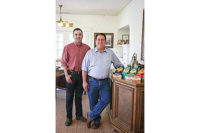Organic yogurt maker Stonyfield Farm has enlisted in the effort to turn tornado-ravaged Greensburg, Kan., into “the greenest town in America.”
As a Charter Supporter of the Greensburg Wind Farm Project, Stonyfield Farm is purchasing carbon offsets to not only counteract their own energy use, but also contribute to the construction of a renewable energy system that will generate enough electricity to power 4,000 homes.
“The wind farm is being built as part of Greensburg’s commitment to rebuild as a model sustainable community, and we applaud the ‘never-say-die’ spirit of the people of this town and the businesses that have stepped forward,” says Gary Hirshberg, company president and CEO. “Wouldn’t it be wonderful if all communities across the nation joined in this effort and made a commitment to sustainability and renewable energy?”
Since 1997, Stonyfield has offset 100% of the carbon dioxide emissions from its facility energy use with carbon offsets offered by NativeEnergy. Stonyfield not only “greens” its electricity supply, but also offsets the global warming impact of its heating fuels and the company’s business travel.
NativeEnergy’s unique “Help Build” carbon funding model brings critical revenues to new renewable energy projects and other projects that reduce carbon dioxide. Electricity generated by the wind farm will displace fossil-based energy and reduce CO2 pollution by hundreds of thousands of tons that otherwise would enter our atmosphere.
“Stonyfield Farm shows time and time again its leadership in social and environmental responsibility. We look forward to continuing our partnership with Stonyfield, helping to build a cleaner energy future and address the growing threat posed by climate change,” says Tom Boucher, president and CEO of NativeEnergy.
Greensburg’s commitment includes becoming the first U.S. city to light its streets with LED lights and the first to have a LEED-certified “green” town hall. The wind farm, being developed by John Deere Renewables, LLC, will be located on farmland just southwest of the city. Several farm families will receive direct economic benefits from hosting the turbines.
“With 95% of its homes destroyed by the May 2007 tornado, this town decided to look to the future and become more environmentally responsible,” Hirshberg says. “The rest of us shouldn’t need that kind of tragedy to avert a global environmental catastrophe. All we need is the will to change.”
Greensburg Goes Green
Looking for a reprint of this article?
From high-res PDFs to custom plaques, order your copy today!



